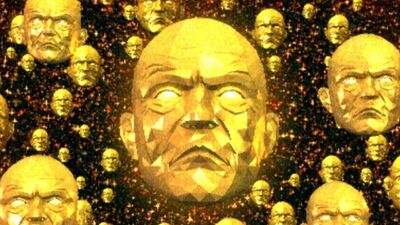The official discord link if you wish to join the discord: https://discord.gg/j5RKwCvAFu
Support the wiki on our official Ko-Fi page or Patreon page!
Category:Deities: Difference between revisions
| (One intermediate revision by the same user not shown) | |||
| Line 1: | Line 1: | ||
[[File:Yhvhheads.jpg|center|400px]] | |||
A '''deity''' or '''god''' is a supernatural being who is considered divine or sacred. The Oxford Dictionary of English defines deity as a god or goddess, or anything revered as divine. C. Scott Littleton defines a deity as "a being with powers greater than those of ordinary humans, but who interacts with humans, positively or negatively, in ways that carry humans to new levels of consciousness, beyond the grounded preoccupations of ordinary life". | |||
Religions can be categorized by how many deities they worship. Monotheistic religions accept only one deity (predominantly referred to as "God"), whereas polytheistic religions accept multiple deities. Henotheistic religions accept one supreme deity without denying other deities, considering them as aspects of the same divine principle. Nontheistic religions deny any supreme eternal creator deity, but may accept a pantheon of deities which live, die and may be reborn like any other being. | |||
Although most monotheistic religions traditionally envision their god as omnipotent, omnipresent, omniscient, omnibenevolent, and eternal, none of these qualities are essential to the definition of a "deity" and various cultures have conceptualized their deities differently. Monotheistic religions typically refer to their god in masculine terms, while other religions refer to their deities in a variety of ways—male, female, hermaphroditic, or genderless. | |||
Many cultures — including the ancient Mesopotamians, Egyptians, Greeks, Romans, and Germanic peoples—have personified natural phenomena, variously as either deliberate causes or effects. Some Avestan and Vedic deities were viewed as ethical concepts. In Indian religions, deities have been envisioned as manifesting within the temple of every living being's body, as sensory organs and mind. Deities are envisioned as a form of existence (Saṃsāra) after rebirth, for human beings who gain merit through an ethical life, where they become guardian deities and live blissfully in heaven, but are also subject to death when their merit is lost. | |||
[[Category:Gods]] | |||
[[Category:Creators]] | |||
[[Category:Supreme Beings]] | |||
[[Category:Demigods]] | |||
Latest revision as of 18:53, 6 February 2023

A deity or god is a supernatural being who is considered divine or sacred. The Oxford Dictionary of English defines deity as a god or goddess, or anything revered as divine. C. Scott Littleton defines a deity as "a being with powers greater than those of ordinary humans, but who interacts with humans, positively or negatively, in ways that carry humans to new levels of consciousness, beyond the grounded preoccupations of ordinary life".
Religions can be categorized by how many deities they worship. Monotheistic religions accept only one deity (predominantly referred to as "God"), whereas polytheistic religions accept multiple deities. Henotheistic religions accept one supreme deity without denying other deities, considering them as aspects of the same divine principle. Nontheistic religions deny any supreme eternal creator deity, but may accept a pantheon of deities which live, die and may be reborn like any other being.
Although most monotheistic religions traditionally envision their god as omnipotent, omnipresent, omniscient, omnibenevolent, and eternal, none of these qualities are essential to the definition of a "deity" and various cultures have conceptualized their deities differently. Monotheistic religions typically refer to their god in masculine terms, while other religions refer to their deities in a variety of ways—male, female, hermaphroditic, or genderless.
Many cultures — including the ancient Mesopotamians, Egyptians, Greeks, Romans, and Germanic peoples—have personified natural phenomena, variously as either deliberate causes or effects. Some Avestan and Vedic deities were viewed as ethical concepts. In Indian religions, deities have been envisioned as manifesting within the temple of every living being's body, as sensory organs and mind. Deities are envisioned as a form of existence (Saṃsāra) after rebirth, for human beings who gain merit through an ethical life, where they become guardian deities and live blissfully in heaven, but are also subject to death when their merit is lost.
Subcategories
This category has the following 4 subcategories, out of 4 total.
Pages in category "Deities"
The following 33 pages are in this category, out of 33 total.
